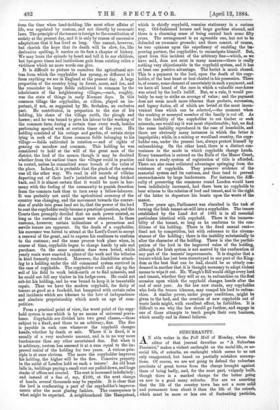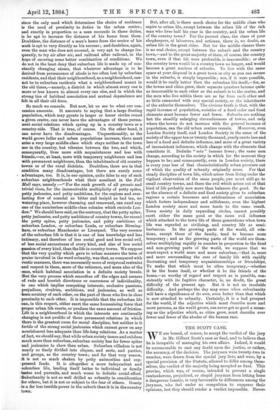SUBURBANITY.
AN able writer in the Pall Mall of Monday, whom the editor of that journal describes as "A Suburban Pessimist," makes a violent onslaught on the social life, or no- social life, of suburbs, an onslaught which seems to us not only exaggerated, but based on partially mistaken assump- tions. Of course, we are not going to defend the suburban precincts of great towns from the charge brought against them of being badly, and, for the most part, vulgarly built, though there is a marked change for the better going on now in a good many suburbs. Nor are we asserting that the life of the country town has not a more solid and permanent tone about it than the life of the suburb, which must be more or less one of fluctuating particles,
since the only need which determines the choice of residence is the need of proximity to duties in the urban centre ; and exactly in proportion as a man succeeds in those duties, is he apt to increase the distance of his home from them. Doubtless, the distance of a man's home from the centre of his work is apt to vary directly as his success ; and doubtless, again, even the man who does not succeed, is very apt to change fre- quently, to try air after air, and railroad after railroad, in the hope of securing some better combination of conditions. We do not in the least deny that suburban life is made up of con- stantly changing atoms, that whatever advantage is to be derived from permanence of abode is too often lost by suburban residents, and that their neighbourhood, as a neighbourhood, can- not be to suburban residents what a neighbourhood meant in the old times,—namely, a district in which almost every one is more or less known to almost every one else, and in which the strong ties of habitual association and mutual dependence are felt in all their old force.
So much we concede. But now, let us see to what our con- cession amounts. It amounts to saying that a large floating population, which may gyrate in larger or lesser circles round a given centre, can never have the advantages of those perma- nent social relations which spring up in a country town or a country-side. That is true, of course. On the other hand, it can never have the disadvantages. Unquestionably, as the world grows fuller and urban populations increase, there must arise a very large middle-class which stays neither in the town nor in the country, but vibrates between the two, and which, consequently, lives more with acquaintances and less with friends,—or, at least, more with temporary neighbours and less with permanent neighbours, than the inhabitants of old country towns or of the rural districts. Doubtless, there are in that condition many disadvantages, but there are surely some advantages, too. It is, in our opinion, quite false to say of such suburban neighbourhoods what their assailant in the Pall Mall says, namely :—" For the rank growth of all prosaic and trivial vices, for the inconceivable multiplicity of petty spites, petty jealousies, and petty ambitions, for the copious and ever- lasting flow of scandal as bitter and insipid as bad tea, no watering-place, however charming and renowned, can excel any one of the numberless middle-class colonies which encircle Lon- don." We should have said, on the contrary, that the petty spites, petty jealousies, and pettyambitions of country towns, far exceed the petty spites, petty jealousies, and petty ambitions of suburban London, or suburban Leeds, or suburban Birming- ham, or suburban Manchester or Liverpool. The very essence of the suburban life is that it is one - of less knowledge and less intimacy, and therefore of less social good and less social evil, of less social earnestness of every kind, and also of less social 'passion of every kind, than the life in country towns. We suppose 'that the very quality which gave to urban manners the term of praise involved in the word urbanity, was that, as compared with rustic manners, there was necessarily more of reciprocal restraint nad respect in them, more of the reticence, and more also of the -ease, which habitual association in a definite society breeds. But the very process which smoothes off the edges and corners of rude and boorish directness or coarseness of individuality, is one which implies competing interests, exclusive passions, ,prejudices, rivalries, ambitions, and jealousies, as well as keen scrutiny of each other, on the part of those who live in close -proximity to each other. It is impossible that the suburban life van, in this respect, either exert the same humanising force that proper urban life exerts, or produce the same amount of friction. Life in a neighbourhood in which the interests are continually changing is not prolific of those permanent relations in which there is the greatest room for moral discipline, but neither is it fertile of the strong social jealousies which cannot grow on any nourishment less adequate than life-long relations. As a matter of fact, we should say, that while urban society tames and subdues much more than suburban, suburban society has far fewer spites and jealousies to show than urban. Suburban villadom is not nearly so finely divided into cliques, and sects, and parties, and groups, as the country town ; and for that very reason, It is not so much shaken by petty animosities and sup- pressed fends. It is altogether a more independent and colourless life, lending itself better to individual or family tastes and pursuits, and much worse to definite social effort. Buburbanity is not so well drilled as urbanity in consideration for others, but it is not so subject to the fear of others. Gossip is a far less terrible power in the suburb than it is in the country town. But, after all, is there much choice for the middle class who aspire to urban life, except between the urban life of the rich man who lives half his year in the country, and the urban life of the country town P For the poorest class, the class of poor shopkeepers, of labourers, and artisans, there is, no doubt, an urban life in the great cities. But for the middle classes there is no real choice, except between the suburb and the country town,—and to the great majority of them, of course, the country town, even if that life were preferable, is inaccessible ; or else the country town would be a country town no longer, and would become a great nucleus of suburbs. To live with the same space at your disposal in a great town or city as you can secure in the suburbs, is simply impossible ;. nor, if it were possible, would it be really better than the suburban life itself,—for, as the towns and cities grow, their separate quarters become quite as inaccessible to each other as the suburb is to the centre, and the men who live within them are as far from each other and as little connected with any special society, as the inhabitants of the suburbs themselves. The obvious truth is that, with the rapid increase of population, societies of a fixed order and fixed elements must become fewer and fewer. Suburbs are nothing but the steadily enlarging circumferences of towns, and only where the towns do not increase with the general increase of population, can the old urban centres remain. Moreover, even London Society itself, and London Society in the sense of the society of the upper ten or twenty thousand, yearly exerts less and less of a fixed and definite influence, and more of a great variety of inconsistent influences, which change with the elements that constitute it. Definite " sets " become fewer ; the same men change, according to the society in which for the moment they happen to be ; and consequently, even in London society, there is every year less of that characteristically urban pressure out of which the quality of urbanity originally arose. For that steady discipline of town life, which arises from living under the vigilant observation of the same people, you must still go to small country towns, and there the evil which arises out of that kind of life probably now more than balances the good. So far as the absence of a definite and fixed society gives to suburban regions a certain looseness and arbitrariness of association which fosters independence and selfishness, even the highest London society more and more tends to the same result. Town society in daily expanding circles, cannot possibly exert either the same good or the same evil influence which attached to the town life of those generations when town life was regarded as civilising, and country life as semi- barbarous. In the growing parts of the world, all rela- tions, except those of the family, tend to become more temporary ; and as the growing parts of the world are them- selves multiplying rapidly in number in proportion to the fixed and non-growing parts of the world, we suppose that we must expect a world more and more suburban,—that is, more and more surrounding the core of family life with rapidly fluctuating and temporary acquaintanceships or friendships. To make that which must be often temporary,—whether it be the home itself, or whether it be the friends of the home,—as worthy of regard and respect as is possible, con- sistently with its fugitive character, is, no doubt, the great difficulty of the present age. But it is not an insoluble difficulty. And perhaps the day may come when suburbanitv will have a significance of its own, even better than that which is now attached to urbanity. Certainly, it is a bad prospect for the world, if the adjective which must describe more and more persons, as the world grows, can never get as good a mean- ing as the adjective which, as cities grow, must describe ever fewer and fewer of the abodes of the human race.



































 Previous page
Previous page